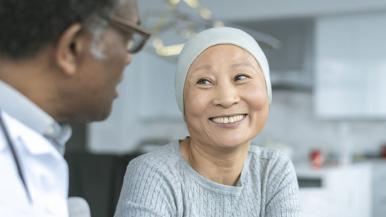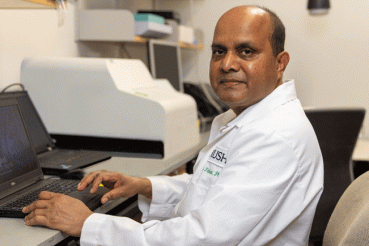Hearing that your cancer treatment has been successful is an amazing moment: You made it!
As life gets back to normal and treatment becomes a memory, it's important to stay alert to your overall health. Some kinds of cancer treatments can have effects that show up in your body months or even years later — so if you notice anything new, talk to your doctor right away for help managing the effects.
Long-term effects of chemo or immunotherapy
If you had chemotherapy or immunotherapy, your heart could be affected later, depending on the kind of drugs you received.
"It's important to know that this kind of treatment becomes a cardiovascular risk factor just like high blood pressure, diabetes or high cholesterol," says Tochukwu Okwuosa, DO, a Rush cardio-oncologist who specializes in the impact cancer drugs can have on the heart.
Congestive heart failure (CHF), or a weakening of the heart muscle, is an effect of some chemotherapy and immunotherapy drugs. Treatment for CHF could include medication, as well as eating a healthy diet, exercising, and not smoking or drinking alcohol. "Not only does living a healthier lifestyle help you take charge of your health, it can also definitely reduce your risk of heart problems," Okwuosa says.
Other symptoms that can arise after treatment include limb pain and numbness or tingling (these are most prevalent with blood cancers such as lymphoma and myeloma). Okwuosa recommends regularly reminding your primary care physician that you were treated for cancer, so they can catch any issues early: Something that seems harmless, like a lingering cough, might need a closer look.
Long-term effects of radiation therapy
If you had radiation, you could see aftereffects on your skin or in the tissue, says Parul Barry, MD, a Rush radiation oncologist.
For example, you might experience skin darkening, redness or dryness. If you had radiation for breast cancer, the irradiated breast tissue might feel a little bit firmer. And radiation for left-sided breast cancers could put you at a higher risk for heart disease.
If you've been treated with radiation recently at Rush, chances are you received the lowest possible therapeutic dose, Barry says: "We do very intense treatment planning with dosimetrists, physicists, therapists and nurses to ensure that we're using the lowest possible doses. That greatly reduces the side effects related to skin and tissue."
People are so thankful that they've survived, but there's sometimes also anger that life has changed forever.
Long-term effects of cancer surgery
If you had surgery, most effects are apparent soon afterward, and differ based on the body part that was operated on. "Surgery can cause lifelong changes," says Susan Budds, NP, a nurse practitioner at Rush who specializes in cancer.
For example, head and neck surgery can result in difficulty swallowing or producing enough saliva. Colon surgery can lead to constipation or diarrhea, and stomach surgery can affect the amount you're able to eat.
"Before you begin cancer treatment, your physician will talk with you up front about possible effects," Budds says. "But when you're diagnosed you're trying to take in a lot of information all at once, and it can be hard to remember later. It's important to reach out if you have any symptoms — if we don't know about them, we can't intervene."
Mental and emotional effects of cancer treatment
Mental and emotional health effects can arise after any kind of cancer treatment, says Budds. "People are so thankful that they've survived, but there's sometimes also anger that life has changed forever," she explains.
"Some people aren't able to go back to life the way it was, so they have to make adjustments like doing a different kind of job or retiring early. And some people have a lot of fear that their cancer will come back."
Talking to someone about how you’re feeling can be a big help: The Psychosocial Oncology Service at Rush University Medical Center offers support not only for people who are undergoing cancer treatment, but for those who are adjusting to life after cancer as well.




